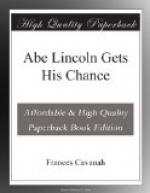“Howdy, Mister,” said Abe. “What is all the excitement about?”
“This is election day,” the man replied, “and I am the clerk in charge. That is, I’m one of the clerks.”
He stopped to write down the name of one of the men who stood in line. He wrote the names of several other voters in his big book before he had a chance to talk to Abe again. Then he explained that the other clerk who was supposed to help him was sick.
“I’m mighty busy,” he went on. “Say listen, stranger, do you know how to write?”
“I can make a few rabbit tracks,” Abe said, grinning.
“Maybe I can hire you to help me keep a record of the votes.” The man rose and shook hands. “My name is Mentor Graham.”
By evening the younger man and the older one had become good friends. Mr. Graham was a schoolmaster, and he promised to help Abe with his studies. Soon Abe began to make other friends. Jack Kelso took him fishing. Abe did not care much about fishing, but he liked to hear Jack recite poetry by Robert Burns and William Shakespeare. They were Jack’s favorite poets, and they became Abe’s favorites, too.
At the Rutledge Tavern, where Abe lived for a while, he met the owner’s daughter, Ann Rutledge. Ann was sweet and pretty, with a glint of sunshine in her hair. They took long walks beside the river. It was easy to talk to Ann, and Abe told her some of his secret hopes. She thought that he was going to be a great man some day.
Her father, James Rutledge, also took an interest in him. Abe was invited to join the New Salem Debating Society. The first time that he got up to talk, the other members expected him to spend the time telling funny stories. Instead he made a serious speech—and a very good one.
“That young man has more than wit and fun in his head,” Mr. Rutledge told his wife that night.
Abe liked to make speeches, but he knew that he did not always speak correctly. One morning he was having breakfast at Mentor Graham’s house. “I have a notion to study English grammar,” he said.
“If you expect to go before the public,” Mentor answered, “I think it the best thing you can do.”
“If I had a grammar, I would commence now.”
Mentor thought for a moment. “There is no one in town who owns a grammar,” he said finally. “But Mr. Vaner out in the country has one. He might lend you his copy.”
Abe got up from the table and walked six miles to the Vaner farm. When he returned, he carried an open book in his hands. He was studying grammar as he walked.
Meanwhile he worked as a clerk in Denton Offut’s store. Customers could buy all sorts of things there—tools and nails, needles and thread, mittens and calico, and tallow for making candles. One day a woman bought several yards of calico. After she left, Abe discovered that he had charged her six cents too much. That evening he walked six miles to give her the money. He was always doing things like that, and people began to call him “Honest Abe.”




